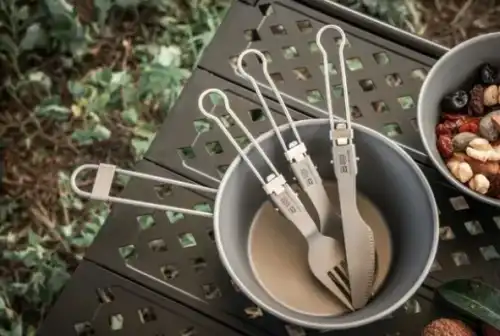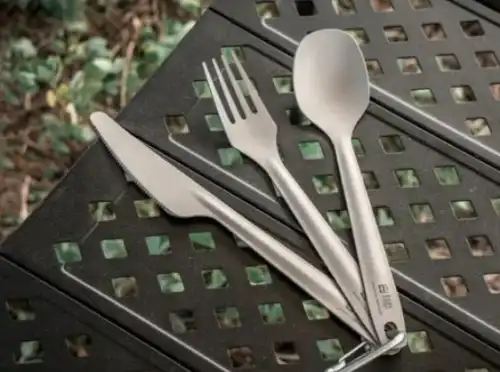Titanium is a metal that is increasingly used in food pots and pans. Generally speaking, titanium food containers are relatively safe under certain conditions.

1. Characteristics of titanium
- Chemical stability Titanium has extremely high chemical stability. At room temperature, a dense oxide film will form on the surface of titanium. This oxide film is very stable and prevents titanium from chemically reacting with other substances. This makes titanium less prone to corrosion or dissolution of harmful substances when it comes into contact with food, unlike some metals. For example, iron is prone to rust in a humid environment, while titanium can maintain good stability even in highly corrosive environments such as seawater. This feature allows pots and pans made of titanium to be used for cooking a variety of acidic, alkaline, or high-salt foods without being corroded.
- Biocompatibility titanium food containers have good biocompatibility. This means that when titanium comes into contact with human tissue, it will not cause allergies, inflammation, or other adverse reactions. In the medical field, titanium is widely used to make medical devices such as artificial joints and dental implants because of its good biocompatibility. Similarly, when titanium is used in food contact materials, its biocompatibility also makes it relatively safe. When the human body ingests small amounts of substances from titanium products, it is unlikely to cause health problems.
2. Application safety in food and pots and utensils
- Food additives In the food industry, titanium is sometimes used as a food additive, mainly in the form of titanium dioxide. Titanium dioxide is often used as a white pigment to increase the whiteness and opacity of food. At present, food regulatory agencies have strict regulations on the use of titanium dioxide in food. Within the prescribed dosage range, titanium dioxide is considered relatively safe. However, in recent years, some studies have questioned the safety of titanium dioxide. Some studies have shown that nano-scale titanium dioxide may pose potential risks to human health, such as causing inflammatory responses or affecting intestinal microbial communities. However, these studies are still in the preliminary stage and more evidence is needed to determine its true impact on human health.
- Pots and utensils Pots and utensils made of titanium have many advantages. First, titanium pots are light, strong, and not easy to deform. Second, titanium pots have good thermal conductivity and can heat food quickly and evenly. In addition, titanium pots are also corrosion-resistant and non-sticky and are easy to clean and maintain. From a safety perspective, titanium pots are safe under normal use conditions. Titanium does not react chemically with food and does not release harmful substances. However, if the titanium pot is overheated, scratched, or damaged during use, the oxide film on the titanium surface may be destroyed, thereby increasing the risk of titanium contact with food. In addition, improper use, such as cooking strong acid and alkaline foods with titanium pots or storing food for a long time, may also affect the safety of titanium pots.

3. Potential risks and precautions
- Potential risks Although titanium is relatively safe in general, there are still some potential risks. As mentioned earlier, nano-scale titanium dioxide may have potential effects on human health. In addition, titanium products may be contaminated by other substances during the production process, and if these contaminants are not fully removed, they may cause harm to human health. In addition, some special groups, such as those with allergies, may be allergic to titanium or certain ingredients in titanium products. Although this situation is relatively rare, you still need to pay attention to observe whether there is an allergic reaction when using titanium products.
- Precautions When using titanium products, you should pay attention to choosing products produced by regular manufacturers to ensure that the product quality meets the relevant standards. At the same time, titanium products should be used and maintained correctly according to the product instructions to avoid overheating, scratching, or damage. For foods containing titanium dioxide, you should pay attention to the ingredient information on the food label to avoid excessive intake. Especially for special groups such as children, pregnant women, and the elderly, food should be selected more carefully.
In summary, the use of titanium in food pots and utensils is relatively safe under certain conditions. However, we cannot ignore the potential risks, and we should strengthen the supervision and research of titanium products to ensure their safety. At the same time, consumers should also pay attention to choosing regular products when using titanium products, and use and maintain them correctly to reduce potential health risks.
YOU MAY LIKE











